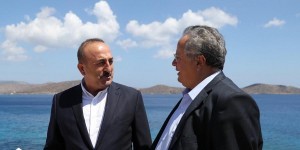Nikos Kotzias, the Greek Foreign Affairs minister will be on an official visit to Ankara, Turkey after accepting a formal invite by his Turkish counterpart Mevlut Cavusoglu, while they were in New York at the UN National Assembly.
Although the two officials have met in several occasions, such as on the sidelines of EU Councils, at Crans Montana for the discussions on the Cyprus issue and during the official visit of the Turkish PM Binali Yildirim, on 19 June, 2017, their last formal meeting took place at the end of August 2016.
IBNA sources speak of multiple invitations by Kotzias to Cavusoglu that never became actual visits. The exact same thing had happened with the Supreme Council of Cooperation between the two countries, which was supposed to have taken place in Thessaloniki but was not realized. The last time the SCC met was in Izmir, Turkey, March 8, 2016, a day after the EU-Turkey agreement in Brussels.
Greek diplomatic sources told IBNA that, at the same time, Turkey follows a systematic policy of challenge and contest against Greece’s sovereign rights. This hampers the improvement of the bilateral relations. The same sources stressed that in the past period there have been several violations against Greece, the most within the last ten years, with some of them being rather serious.
No matter how great the effort of Greece is to transform the Greek-Turkish controversial relations into cooperative, sources from Greece believe that the provocations in the Aegean, Turkish officials’ reproachful or at times inflammatory speech, the disputed Greek sovereignty over certain islands and islets, the “leak” concerning the transformation of Aghia Sofia (in Istanbul) into a mosque and the representation of Greece as a terrorists’ (FETO, PKK etc.) refuge in some media, create an especially negative climate for the bilateral relations. All of the above together with the violations are increasing the danger of a possible “accident” with unimaginable consequences.
Diplomatic sources told IBNA that the Greek side is making a great effort to keep the road of contact with the Turkish side open, and be able to create a link for cooperation. Such a need to communicate and cooperate is clear and obvious after each meeting between Tsipras and Erdogan or between Tsipras and Yildirim, since after every such meeting there is de-escalation of tension among the two countries.
A similar de-escalation can be corroborated by the result of the Tsipras-Erdogan meeting in Beijing, in May 2017, after which the Turkish side stopped the verbal doubting of the Lausanne Treaty.
A high official of the Greek FM ministry said that the more the problems become the worse the relations get. So, Greece has to use its diplomacy more, minimize the tension and start a fertile dialogue.
When IBNA spoke to a Turkish high diplomatic official sharing the Greek side’s thoughts, the former told the agency that Turkey aims to keep up the effort to improve bilateral relations as both partners will benefit from it.
Regarding the postponement of the Greece-Turkey SCC the diplomat said that Turkey had to cope with extremely serious matters back then, and thus they chose to postpone the meeting.
The same source hopes that Turkey will refresh its ties with Greece, this time on a creative and productive way that will satisfy both.
IBNA’s exclusive sources said that Kotzias and Cavusoglou will focus on bilateral issues and discussions on regional matters.
Source: balkaneu.com
Ask me anything
Explore related questions





